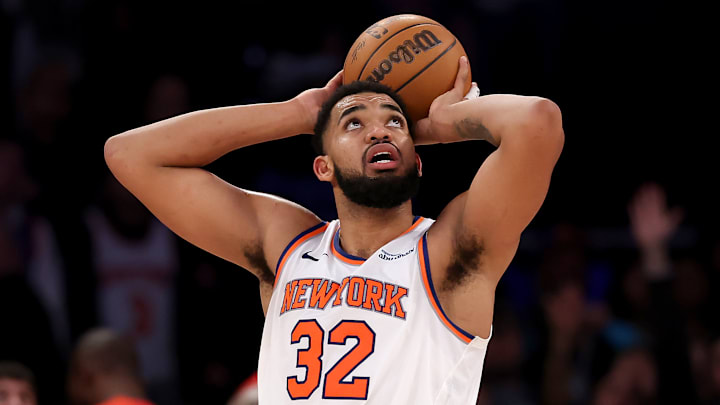The New York Knicks are running into a world of issues in their first-round playoff series against the Detroit Pistons. Strap in if you haven't already. The list is not short.
The Knicks have a secondary shot-creation problem. They have a Josh Hart problem. It turns out they still have a Cade Cunningham problem. Depending on who you ask, they either have a depth problem, or a Tom Thibodeau problem. They most definitely have a Mikal Bridges problem.
Most critical of all, the Knicks have a Karl-Anthony Towns problem. It is an issue connected to many of their other warts. It is caused at all by one in particular: a lack of advantage creation beyond Jalen Brunson.
If the Knicks had another conventional advantage creator—i.e. someone who reliably puts set defenses in rotation, and generates high-end opportunities for everyone else—they would not live and die by KAT's peaks and valleys. (The same goes for the Mikal Bridges experience.) But New York does not have that type of second-in-command behind Brunson, which is why they cannot afford nights like Game 2, in which Towns nearly set a season low for his number of touches.
Towns had 35 total touches all night, his second-fewest in any game this season.
— Yaya Dubin (@JADubin5) April 22, 2025
Fortunately for them, the solution to their Karl-Anthony Towns problem should be relatively simple. If it's not, it will speak volumes about his future in New York, Thibodeau's job security, or both.
The problem: KAT is not involved enough in New York's playoff offense
Raw numbers tell most of the KAT story. He averaged 24.4 points during the regular season. Through two games against the Pistons, his scoring output has dropped to 16.5 points per game—despite playing more minutes.
New York's Towns problem isn't just about his putting the ball in the bucket, though. It isn't even about his aggression when he has the ball. It is primarily about getting him the ball at all.
Towns received around 37.8 frontcourt touches per 36 minutes during the regular season. That number has plummeted to 26.1 versus the Pistons.
Small samples can be noisy, and are not always telltale. But the entire playoffs is a small sample. The Knicks do not have the margin for error, or the time, to remain complacent. They must act now.
The cause: Detroit has changed how it's defending KAT
Unearthing a solution first requires understanding the cause behind KAT's lack of involvement. To that end, a couple of driving factors are at play.
Towns himself definitely needs to be more aggressive. Thibs needs to ensure he's having his talented behemoth set more ball screens. And Brunson must do more to set up his big man, rather than settling for ultra-difficult shots.
A defining play of the game imo pic.twitter.com/hDAcg5eaya
— Rit Holtzman (@BenRitholtzNBA) April 22, 2025
Truthfully, though, the Pistons are driving Towns' struggles more than anything else. They have fundamentally changed the way they guard him.
Jalen Duren and Isaiah Stewart spent more time defending KAT during the regular season than any of Detroit's other players. That script has flipped in the first round. Tobias Harris has been his primary defender through two games. This frees up Duren to be stashed on Hart, and roam around the half-court, gumming up the works for everyone else.
The results are disastrous—for the Knicks. Their offense is averaging just 0.96 points per possession when Harris registers as the defender on Towns. For context, New York averaged over 1.19 points per possession in the regular season with KAT on the floor.
The solution: More Deuce McBride
Given how Detroit is defending Towns, the Knicks' top priority must be figuring out how to make them deviate from their game plan. And the answer here is simple: They need to play Hart less, and play Deuce McBride more.
Detroit cannot get away with stashing Duren (and others) on McBride like they can with Hart. Sure, Deuce closed the season canning under 35 percent of his triples over the final 15ish games, and he's just 2-of-6 from downtown in this series. He is still a greater threat from deep by volume alone. His 7.1 three-point attempts per 36 minutes during the regular season more than double-up Hart's 3.1. McBride also ended the year converting almost 37 percent of his treys, a far cry from Hart's 33.3 percent clip.
Beyond that, and most importantly, subbing out Hart for McBride forces the Knicks to involve Towns more often as the screener. Right now, they seem focused on getting Hart to set ball screens, so they can directly involve his man in the action. If you have KAT set ball screens with Hart on the court, the latter's defender can easily help off him. But if you plop Deuce into Hart's place, you force the Pistons into more difficult decisions, and likely more complex rotations.
Going this route does make the Knicks' core lineup much smaller. So be it. The data behind Deuce-plus-non-Hart starters is encouraging enough to roll the dice. Thibodeau did not play him beside Brunson, KAT, Bridges and OG Anunoby often during the regular season; just 82 possessions. But New York notched an offensive rating of 130.5 through these brief stretches. That is better than elite. It is the equivalent of the best offense of all time.
This is not to say the results will perfectly hold against the Pistons. They won't. Still, more of Deuce is a promising alternative to the status quo. Because even if the Knicks give up ground on defense and the boards as a result, they gain something much greater, and far more pivotal: an easier path to unlocking the version of Karl-Anthony Towns they can't afford to be without.
Dan Favale is a Senior NBA Contributor for FanSided and National NBA Writer for Bleacher Report. Follow him on Bluesky (@danfavale), and subscribe to the Hardwood Knocks podcast, co-hosted by Bleacher Report's Grant Hughes.
